How Social Media is Overwhelming Each Myers-Briggs® Personality Type
Have you ever wondered if social media hurts or helps you, based on your Myers-Briggs personality type?
Almost nothing has been as controversial as the rise of social media. People everywhere debate whether it’s a powerful means of connection and friendship or a dangerous force that threatens to tear society apart. There’s no conclusive answer, but what we do know is that social media has created a relationship between people and their phones like never before in history.
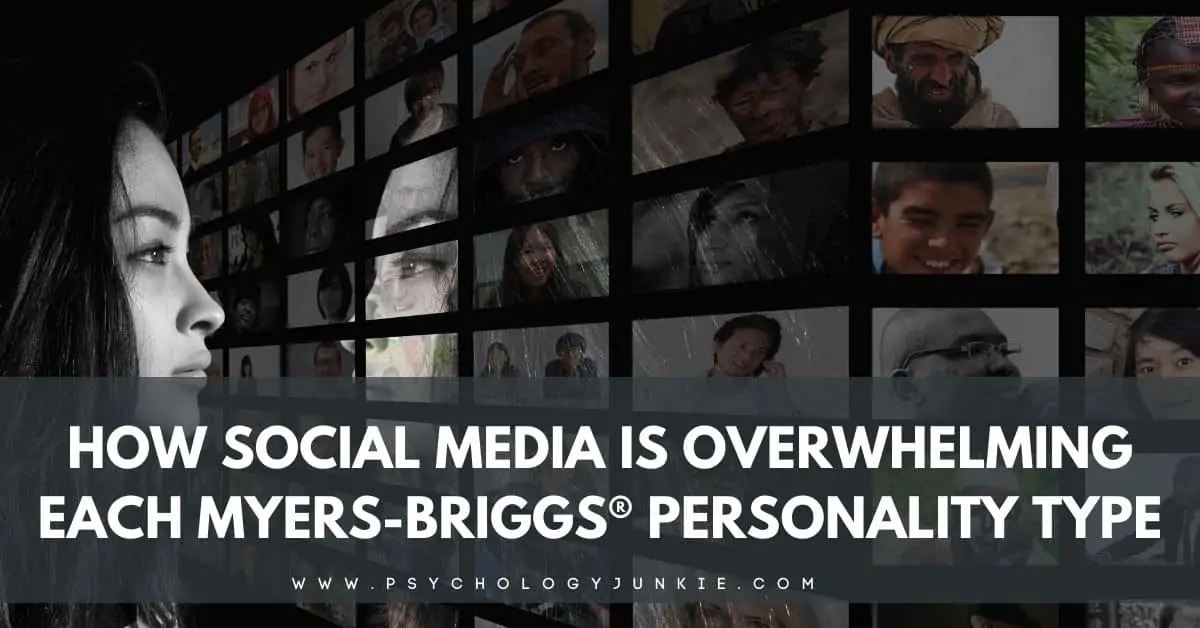
How does social media impact people?
What role does it have in our mental health?
How can we have a safe and healthy relationship with social media?
Before we get to the specific personality types, I want us to look at some of the pros and cons of social media. Because it’s not as simple as saying it’s good or bad, right or wrong. Nothing about social media use is black and white.
Not sure what your personality type is? Take our new personality questionnaire here. Or you can take the official MBTI® here.
Table of contents
Estimated reading time: 23 minutes
The Pros of Social Media:
- Allows you to connect with family and friends all over the world
- Gives you the opportunity to find a community of people with similar interests
- Helps you to raise awareness for worthwhile causes
- Enables you to comfort and offer emotional support to people during rough times
- Provides opportunities for self-expression and creativity
- Introduces you to a diverse array of information, perspectives, and viewpoints
- Allows you to further understand what it’s like to be in the shoes of many different people from all walks of life
- Helps you to bring attention to your business, organization, workplace
- Can act as a digital photo album for your memories
The Cons of Social Media:
- Has the potential to lead to image and appearance issues (body-image issues, etc,.)
- May lead to increased feelings of loneliness over time
- Can lead to cyberbullying (10% of teens report being bullied on social media)
- May become unhealthily habit-forming, to the point where real relationships fall by the wayside
- Can cause parents to become inattentive, distracted, and neglectful of their children
- Can cause children to experience increased stress, distractability, and feelings of fight-or-flight
- Can cause people to become distractible, unfocused, and confused
- May lead to negative comparisons between self and others
- Can lead to excessive self-absorption
- Light from phone screens can lead to disrupted sleep and insomnia
- May lead to worsening symptoms of anxiety and depression
- Can become so consuming that it takes attention away from self-reflection and careful thought
When It’s Become Too Much:
Social media use can be a benefit or a danger regardless of your Myers-Briggs® personality type. If you’re reading this article and you’re aware that social media is negatively impacting your life, here are some ways to cope and find relief.
- Become aware of your screen time and reflect on how it’s impacting you
- Rate how you feel before and after using social media. Then rate how you feel before and after doing other activities that you enjoy. Consider how you can re-prioritize your time so that you’re in an improved mental state.
- Turn off your phone and leave it in a separate room during particular activities (mealtimes, meetings, dates, when you’re playing with your kids, etc,.)
- Use an app to track how much time you spend on social media every day. You can also set goals for how much you want to limit social media use.
- Don’t take your phone to the bathroom.
- Disable social media notifications.
- Remove social media apps from your phone.
- Consider how you might be substituting social media for real life, and circumvent that.
- Take time for reflection, mindfulness, and nature.
- Volunteer for a cause that matters to you and that gets you out in the real world having real interactions with people.
As you read the rest of this post, please scroll back up here if you recognize your frustrations and need to find relief. It’s never too late to change your patterns and experience more mental clarity.
The ENFP
As an ENFP, you’re someone who craves options, ideas, and possibilities. At first glance, social media seems to offer all of these things. There are limitless ways to communicate, endless streams of information, and dozens of possibilities in which to express yourself. However, social media is a paradox. You can’t read as much as you want to in a day, you’ll never have the time to reply to all of your friend’s comments, and there are more shallow streams of input than meaningful ones.
In fact, social media is so overwhelming that it’s actually draining your energy. You can’t process it all at once, and so instead of feeling inspired or invigorated by it, you become exhausted. The more you read, the more drained you feel because there’s always going to be something new – a different article about a different idea. No one, not even an Extraverted Intuitive type, can keep up.
On top of the information overload, there’s the fear of missing out. Perhaps you’re struggling financially and seeing your friends’ photoshopped vacation photos is making you feel trapped. Maybe you’re grappling with health issues, and seeing people bragging about their latest fitness regime makes you feel disillusioned. Perhaps you have acne and seeing filtered Instagram photos sends you in a downward spiral of self-defeating dialogue.
The truth is, spending time with real people in real life is much more conducive to mental health. When we spend time with friends or loved ones and make eye contact, we experience a flood of hormones that reduce stress and make us feel happier and more positive. It’s also important to remember that social media often shows us the “highlights” of people’s lives. Thus, it’s very one-dimensional. We often don’t see the pain, the struggles, and the failures. In real-life interactions, we’re better able to form connections with who someone really is – not just their highlight reel.
Read This Next: The Unhealthy ENFP
The ENTP
As an ENTP, you are inspired by innovation and creativity. By the time you’re halfway through watching a video on YouTube you’ve likely already been distracted by ten other interesting videos. While these videos give you some unique ideas, you can lose track of time as you endlessly click, view, and click some more. Eventually, you can wind up feeling scattered, unfocused, and uncertain.
The reason for this is simple: most social media sites are filled with short videos, memes, quotes, and images. Your eyes are drawn to all these fascinating tidbits of knowledge (or entertainment). While many are interesting, they don’t give you the time needed to process them fully. Perhaps there are ideas worth pondering on Facebook, Instagram, Snapchat, etc., but because of the nature of these sites, you’re more likely to glance and move on than stop and think.
For ENTPs, it’s important to realize and accept that there is a difference between “being online” and “being in the moment.” You can’t do one without interrupting or causing damage to the other. I suggest only checking social media when you find yourself with extra time (e.g., waiting in line, waiting for friends, etc.). Make time for real-life experiences, recreational activities, or one-on-one connections with the people you love.
Read This Next: 10 Surprising Truths About ENTPs
The INFP
As an INFP, you don’t just seek meaning – you create it. You are passionate about empathy and understanding, and nothing makes you feel more alive than being creative. And yet for all of your passion and concern for other humans, social media can feel draining.
At first glance, social media seems like an exciting place where you can connect with other idealistic individuals who share your values. But the image-focused nature of it can leave you feeling disillusioned with society…or yourself. As an introverted feeling type, you need space for quiet reflection, introspection, and imagination. What happens when every spare moment is spent scrolling, watching videos, or outsourcing your imagination to others?
For many introverts, the answer is loneliness, feelings of inadequacy, over-stimulation, irritability, and despair.
You want more than the image-focused, flashy world of Instagram or the often argumentative atmosphere of Twitter. You want a place for quiet reflection, meaningful connection, and self-discovery. This is exactly why you enjoy books so much. Unlike social media posts that are designed to be quick hits of inspiration or distraction, books allow you to connect with characters in an original way that unlocks your imagination, lengthens your attention span, and encourages empathy and creativity.
For you, social media can be a gateway to new friendships and creative sources. But it’s crucial to consume it in moderation and leave plenty of room for self-exploration, self-expression, and absorbing life in the real world.
Read This Next: A Look at the INFP Leader
The INTP
For you, social media is a convoluted web of random ideas, perspectives, connections, and possibilities. The intuitive side of you is drawn to the sheer breadth of creative innovation found on places like Reddit, Twitter, TikTok, or Instagram. Yet while these channels can be a valuable means of connection, they can also feel draining if used too often or without the proper energy reserve.
As an introverted thinking type, it’s crucial for you to have time to pause and reflect on what you take in. You also need time to be bored. It might sound crazy, but the process of being bored allows your mind to come up with ingenious ideas, possibilities, or solutions. In our current climate, many people fill all their free space with social media, reacting quickly, and tapping buttons in rapid-fire. This is the exact opposite of the environment you need to thrive. You need time and space for deep thinking – or what some call “a daydreamer’s paradise.”
As an INTP, it’s crucial to take time for yourself – even if that means drastically reducing your social media consumption for a while. Leave room in your schedule to daydream, to reflect, and to take in life’s rich details without interruption. Social media is often called “the world at your fingertips.” But sometimes it can feel like you’re holding an entire world in your hand…a world that you don’t know how to stop juggling.
Read This Next: 24 Signs That You’re an INTP, the Prodigy Personality Type
The ENFJ
For you, social media is about communication. You are happiest when you can make connections with other people through your words. At first glance, social media seems like a beautiful way to get to know a wide variety of people from all walks of life. You enjoy the opportunity to chat with people or see videos from people you never would have imagined talking to otherwise.
Yet the fractured nature of social media often leaves you feeling isolated and misunderstood. It’s incredibly easy to have misunderstandings online because there’s no face-to-face recognition and, in some cases, your words are limited. The recipient of your words doesn’t always see your warm smile or hear your friendly tone. Misunderstandings abound in a landscape focused largely on image, attention, and vanity.
As an extraverted feeling type, it’s crucial for you to feel like you can connect with others in meaningful ways. Social media offers so many possibilities for this connection but they are often lost in all the noise created by angry tweets, viral memes, and self-promoting posts. For this reason, it’s important to keep your social media consumption in check and find ways to connect with people in person. Face-to-face interactions feed your soul in a way that text-based interactions can never live up to.
Read This Next: The Top 7 Gift Ideas for ENFJs
The ENTJ
You thrive on forward momentum as an ENTJ. A busy, productive existence drives you closer to your long-term goals. Social media often seems like a roadblock to the things you value in life. So much of the social media landscape is focused on image, futile arguments, or entertainment. Much of it is a waste of time that could be spent on more productive activities. While LinkedIn may be beneficial to your goal-driven attitude, other social media sites are distractions that get in the way of accomplishing things.
But even though you’re a goal-driven ENTJ, nobody is immune to the habit-forming nature of social media. Anytime you get a like, a share, or a positive comment, your brain releases a flood of dopamine. This is the same hormone that is released when you eat good food, win at a slot machine, or have physical intimacy. Because of this, many people compulsively post on social media to keep feeding their brains this “feel-good chemical” However, the long-term implications are often anxiety, stress, and even physical ailments.
So if you’re an ENTJ, try to remember that you function best in the real world around you. As an extrovert, you thrive when you can react to your environment, get things done, and have meaningful in-person connections. Set aside specific times for checking your social media accounts and leave your phone elsewhere when you have higher priority activities on your agenda.
The INFJ
As an INFJ, you do your best thinking when the world around you goes quiet. In the stillness, you can draw into yourself and explore ideas, insights, and meaningful concepts. Having a smartphone nearby can feel like an invasion of the space you need to think clearly. To make matters worse, social media is loud. It’s filled with constant updates about people doing things they want you to see or advertising things they want you to buy. This barrage of messages can leave you feeling bombarded by wannabe celebrities who are attempting to control your life.
Social media isn’t all bad, of course. At first, it seems like an efficient way to achieve personal growth. There are many “gurus” and self-help experts online with bite-sized bits of wisdom to share. However, the noise, clutter, and hypnotic nature of social media can leave you doom-scrolling for far longer than you intended and feeling drained and anxious in the long run.
Even worse, social media can have a direct impact on your emotional health. According to research from the University of Michigan, “high use of Facebook was negatively associated with well-being.” In other words, the more you use Facebook, the less happy you feel.
When you can spend time in nature and cultivate your deep thoughts and feelings, you often experience a feeling of peace and connection to the world around you. When you read a book or see a movie that touches your soul, you’re left with meaningful insights and ideas to bring into the future. When you spend time with a friend or loved one who truly sees you, you feel empowered and refreshed.
While social media is useful for connecting with people in far-away places, it’s important to take time away from your phone and spend time on things that truly matter to you as an INFJ.
Read This Next: 24 Signs You’re an INFJ, the Mystic Personality Type
The INTJ
You are likely to feel conflicted about social media. On one hand, it seems like a necessary tool for staying connected with colleagues, family members, and friends who are spread across the globe. There’s also something to be said for staying up-to-date on current events or researching areas of interest on various platforms where you can debate, get other perspectives, or ask questions.
However, the noise, chaos, and attention-seeking nature of social media tend to leave a bad taste in your mouth. Often people argue for the sake of arguing, without any good evidence to back up their assertions. The sheer commotion and sensory over-abundance of social media can also be too much for you to deal with. As an introverted intuitive type, you do your best thinking when you’re undistracted and the world around you is quiet and still.
You are likely to feel at your best when you can spend some time in solitude after organizing your thoughts and feelings. When you can reflect on the world around you without interruption, it’s easier to make decisions and gain clear insights. You can also feel less disillusioned with humanity when you’re not seeing peoples’ impulsive, logic-bare retorts or overly-filtered Instagram photos.
Read This Next: The Childhood Struggles of INTJs
The ESFP
As an ESFP, you’re likely to love social media. It’s a fun way to stay up-to-date with your friends and see what they’re doing in their lives. The simple act of scrolling through Twitter or Facebook can make you feel like the people who matter most in your life are right there with you—even if they’re not. You also enjoy seeing people’s reactions to events that take place around the world, especially if it gives you an opportunity to joke about them with your friends later on.
However, social media can overwhelm you in some cases. FOMO can eat at you when you see people out living “their best lives” and you’re stuck at your desk or unable to do the activities you crave. For many, social media is a window through which they can view missed experiences. And that alone feels like torture to someone like you who craves new experiences and adventures.
You especially hate it when you’re trying to talk to someone and they’re too distracted by their iPhone to be attentive. You may start to feel like the only one who really wants to stay “present” and experience all the beauty of the moment as it is.
You’re at your best when you can be around people who are present with you in person. You also need time in nature and out in the real world, having real, tangible experiences. Whether you’re biking along the coastline, dancing in your living room, or taking a cooking class; experiences that are hands-on and actionable give you real fulfillment. Try to make time for these life-giving pursuits and other people who appreciate them as well.
The ESTP
You are likely to enjoy social media to an extent. It gives you a chance to stay up-to-date with your peers, check out upcoming events, or share witty remarks about the latest headlines. But at the same time, you miss the action and spontaneity of real-life interactions. You’re someone who likes to be involved with the world around you; whether that means hiking a mountain or trying out the newest restaurant in town. Stagnantly scrolling and viewing other people’s lives for long will make you feel bored and restless. You want to get out there and really interact with the world in a hands-on way.
Many ESTPs find that people are less and less interested in recreation and in-person events now that they have social media. Often, people find themselves latched to their Twitter feeds rather than the real, vibrant, natural experiences available to them. You are likely to feel lonely or frustrated when you realize that people around you aren’t open to doing things outside of their screens. You will also find yourself spending less time with people who don’t share the same interest in being present and being physically active.
It’s crucial for you to balance your social media time with time out in nature. Whether that means hiking in the woods, kayaking, or just going for a drive. Make time for real-world experiences, nature, fresh air, and face-to-face human interactions. Being out in the natural world can reduce stress, improve mood, and even improve empathy and cooperation. You’ll feel more mental clarity and optimism about life if you can have a life composed of real, tangible experiences rather than observed experiences on a screen.
The ISFP
You see social media as both a blessing and a curse. It’s nice to be able to scroll through your feed and find updates from friends or photos of cute pets. You like how social media platforms can make you feel connected with people who are far away yet still intrinsic in your life.
Yet social media begins to overwhelm you when people are too focused on it. You like to be present and right there in the moment with others; not off scrolling away while someone is trying to talk to you.
Additionally, you feel bad for people who don’t understand that social media isn’t real life. They post edited or filtered photos of themselves and it’s often not reflective of what they really look like in real life. People can portray themselves as very fun-loving and popular when they could be stuck at home feeling lonely. Social media isn’t reality; you get that. You just wish that other people did too. You know that “buying in” to the hype of social media can result in negative self-esteem, anxiety, and loneliness. You can sometimes feel this creeping up on you; the pressure to appear a certain way or to have an Instagram-worthy life.
When you’re overstimulated by social media, try to take a break from it. Leave your phone at home for an afternoon or make an agreement with yourself not to check your feeds until the end of the day. You can also go out into nature or do something creative like writing, drawing, or painting. These activities give you more agency than scrolling through social media and will help you feel relaxed and inspired.
Read This Next: What it Means to be an ISFP Personality Type
The ISTP
For you, social media is a place to share useful information or learn new skills. You enjoy using it as a platform to talk about a wide range of interests, including science and anything else that catches your attention. Social media lets you have very complex discussions that are often hard to find in the real world.
Yet social media overwhelms you when it distracts you from the real-world experiences that make you feel alive. You hate how digital life has become and crave opportunities to engage with the world with all five of your senses. You don’t like being DMed, texted, or notified of every single little thing your acquaintances are doing. You’d rather be responding to life as it comes in a physical sense; flying a kite with your kid, roasting marshmallows at a bonfire, or playing a musical instrument. Even gathering your friends for a video game marathon feels more interactive and exciting than scrolling Facebook.
You love the real world because you find it interesting, engaging, and raw. You struggle with social media because you find it shallow and heavily edited; nothing like reality at all. It’s important for you to be present and to disconnect from time to time in order to keep your sanity. When you’re overstimulated by social media, find things that give you a sense of real life: cooking, driving, or hiking outdoors, for example.
Read This Next: The Top 7 Gifts for ISTPs
The ESFJ
For you, social media is a place to express your creativity and maintain relationships. You love sharing photos of the meaningful moments in your life and seeing how your family and friends are doing through their witty updates, photos, or videos. You get to feel like you’re hanging out with your friends even when you can’t be together in real life.
Yet social media overwhelms you when it becomes too invasive. You like having a few specific friends on social media that you can follow along with, but not have your whole feed flooded by everyone’s news and opinions. Conflicts over politics, miscommunications brought about by lack of human connection, these things can quickly burn you from social media. You know that if people were face-to-face they’d be kinder and treat each other as fellow humans. Yet behind a screen, people can be cruel, argumentative, and harsh.
You love the real world because it gives you a sense of perspective about what truly matters. You appreciate people who will get together for a cup of coffee and put their phones away. The sensation of real-life experiences gives you inspiration and deeply-felt joy. Whether that’s the tactile sensation of mixing up ingredients in the kitchen, the warmth of a friend’s hug, or the awe-inspiring sight of a pink/orange sunset. Make sure that you’re taking a break from social media and having real-life experiences. Life itself will feel more fulfilling to you as a result.
Also, make sure you’re getting face-to-face interactions with people. When you communicate with people and have eye contact, you connect on a deeper level. Plus, face-to-face interactions trigger the hormones that alleviate stress, and make you feel happier and more positive.
The ESTJ
For you, social media is a way of keeping up with your friends and their accomplishments. You love that it makes it easy to receive updates or news about events going on in people’s lives that you’re interested in. You can even meet new people online with whom you share common interests, and make lasting friendships. On top of that, you love the efficiency of sharing an announcement or event on social media without having to call everyone individually and spend a lot of time sharing news.
However, social media overwhelms you when it becomes a distraction from your real-life goals and endeavors. You consider yourself a productive person, and enjoy staying focused on the task at hand. Yet social media is a constant temptation. You might find yourself scrolling through your newsfeed at work, or catching up on the happenings of friends instead of connecting with the friends right in front of you. While some people see no problem with this, you tend to be especially hard on yourself. You want to always be doing something productive, and living up to your standards. You are likely the type of person who hates distractibility, procrastination, or “brain fog” and social media use can lead to all three.
Make sure to take breaks from your device throughout the day, and make sure you’re balancing social media with real-life activities. Pick a day each week that you will “unplug” and spend time only in the real world. Doing this can help you to feel more inspired, connected with nature, and connected to the people you love. It can also reduce stress and improve your overall mental clarity.
The ISFJ
For you, social media is a way to stay in touch with family and friends. You like being able to take part in your loved ones’ lives even if they live halfway across the country! You can also use social media to peruse hilarious memes that make you laugh or watch videos that warm your heart.
What overwhelms you about social media is the constant connectivity that you have with everyone. You like staying in touch with your loved ones, but you also crave time where you can be alone without obligations or interruptions. Information overload can make you feel mentally hazy, anxious, and distracted. You might find yourself wanting to enjoy a morning sunset but getting too many notifications to really take it in. Or you might find yourself comparing yourself to others in a negative way. Maybe your kitchen isn’t Pinterest-worthy, or the birthday party you just had wasn’t nearly as momentous as that of one of your friends. Social media has a nasty habit of making us feel like we’re “missing out” or “not good enough.”
You especially hate the conflict that erupts in the social media sphere. People aren’t as kind when they can’t see the person they’re texting face to face. Fights break out over political differences or misunderstandings brought on by the cold, emotionless world of text-only communication. Someone might say something jokingly and be completely misrepresented because their facial expressions can’t be read.
It’s crucial for you as an ISFJ to have time to yourself, away from your phone. Turn off notifications and spend time in the places you love. Write down your thoughts in a journal to get help processing your emotions. You also will feel more fulfilled by having face-to-face interactions with the people you love. Actually being present with someone can help you to feel connected, understood, and encouraged in a way that social media can’t live up to.
Read This Next: The Unique Intelligence of the ISFJ, ISTJ, ESFJ, and ESTJ Personality Types
The ISTJ
You’re someone who enjoys delving into your hobbies and areas of interest in-depth. You like that on social media you can ask a question about something, and (if you’re in the right forum) get dozens of useful interactions very quickly. It’s easy to find communities of people who care about similar topics as you do.
Simultaneously, you dislike the superficial nature of social media. You realize that for many people it’s a source of vanity and a way to feed their egos. Rather than show their struggles and their real human experiences, they show their fancy clothes, filtered photographs, and attention-seeking reels.
For you as an ISTJ to be at your best, it’s important to set aside time where you can focus on the things that matter to you. You need structures and plans in place so that your life doesn’t become too scattered or chaotic. Take some time now to consider what truly matters and what makes you happy. Then, prioritize those things in your life. Track your emotions before and after using social media, as well as before and after other activities. If you notice that before using social media your mood is at a five, but afterward it’s at a three, maybe that’s a sign that you that you should take a break from it.
You also need to take time for face-to-face communication with people who are close to you. While you’re a private person, you also need human warmth and encouragement. Being face-to-face with friends and loved ones triggers the hormones that alleviate stress and improve your mood overall. You can feel more connected to the world around you when you make time for community, friendship, and relationships.
Read This Next: 24 Signs That You’re an ISTJ, the “Detective” Personality Type
What Are Your Thoughts?
Did you enjoy this article? Do you have any insights or stories you’d like to share? Leave us a comment and let us (and other readers) know!
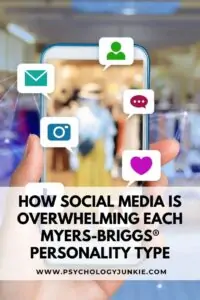
Subscribe to Our Newsletter

Want to discover more about personality type? Get the inside scoop with Susan Storm on all things typological, along with special subscriber freebies, and discounts on new eBooks and courses! Join our newsletter today!


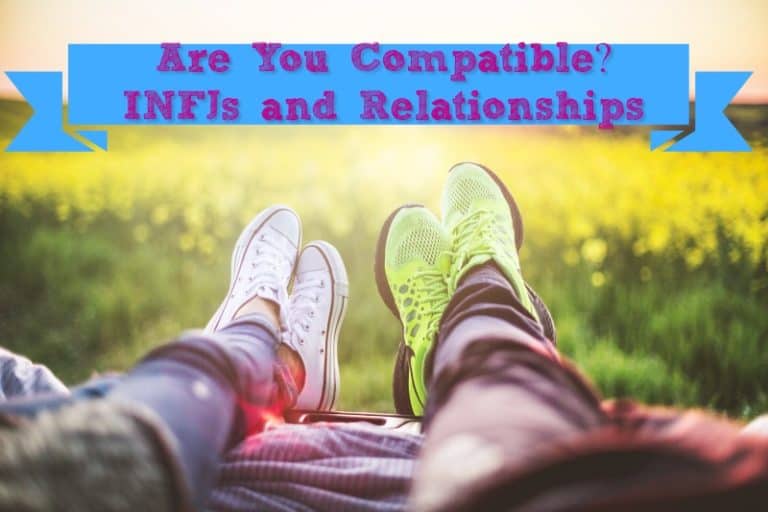
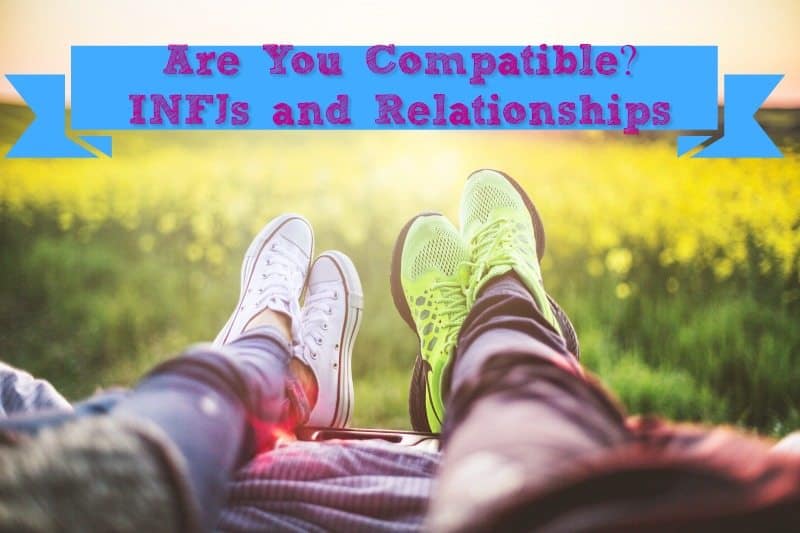
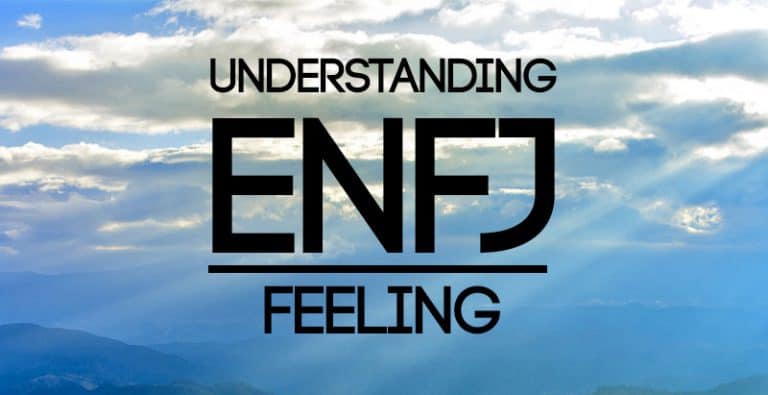
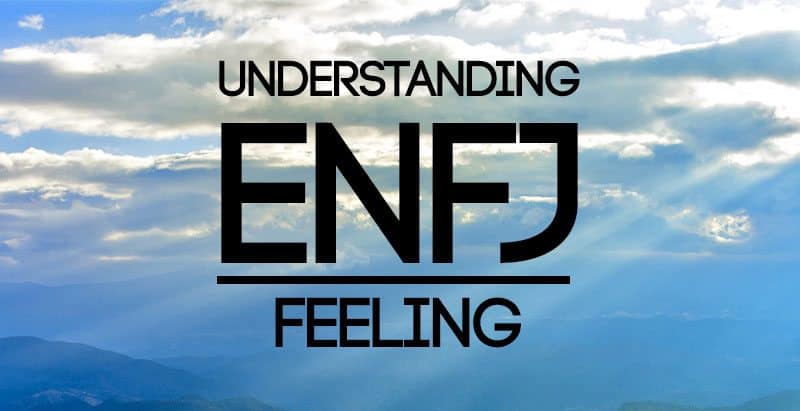


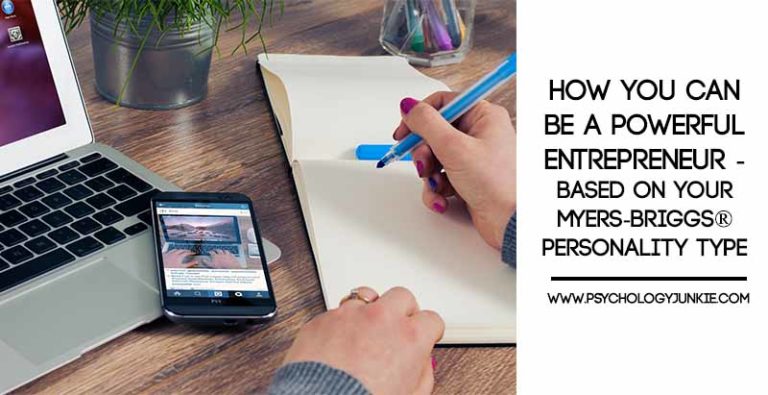
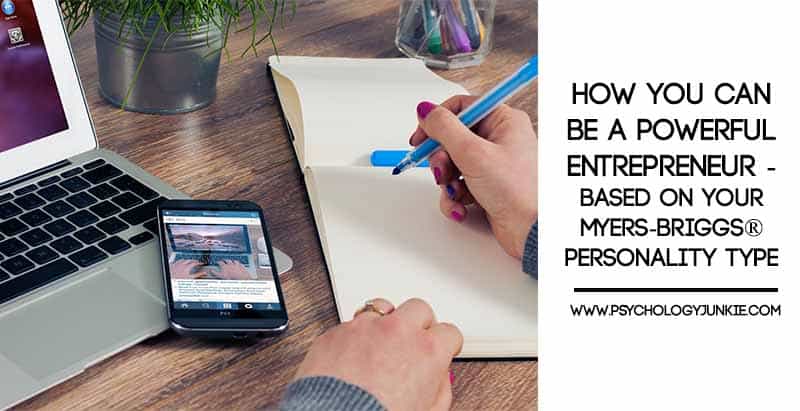
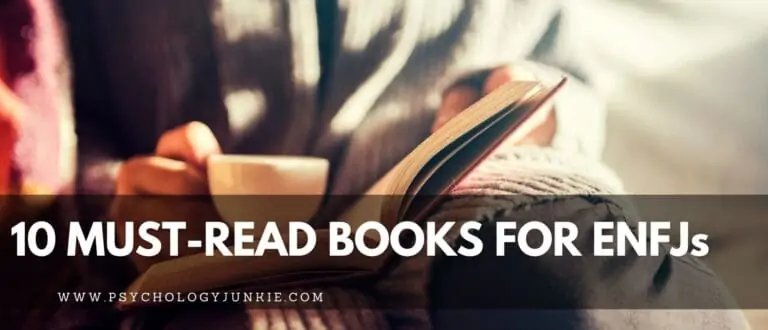
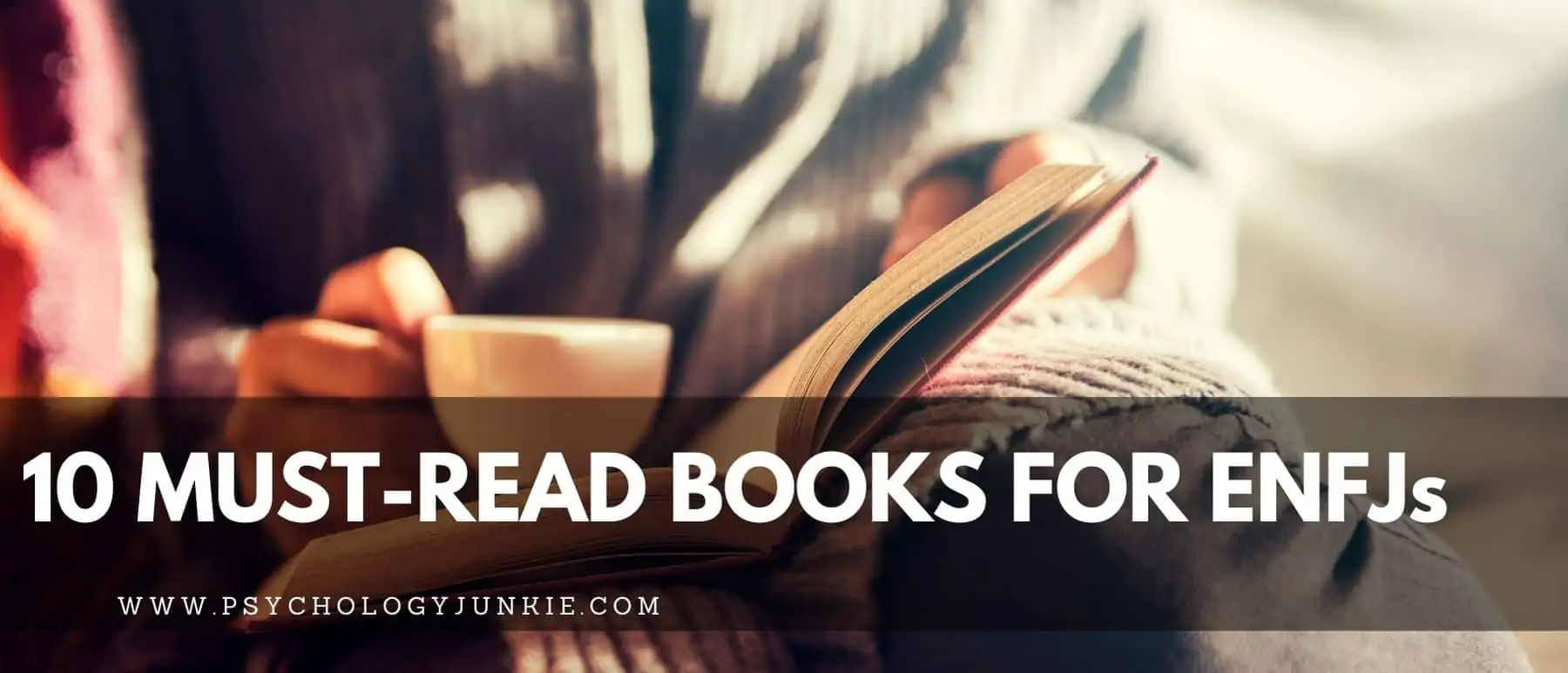
As an INFJ i also have the feeling people misjudge my tone of writing style, alot people write more logical and rational.
First, love all your articles and you’re one of the few email subscriptions I’ve continued. I look forward to and always get something from them, so “thank you”. In regard to social media, as an infp guy, I crave authenticity, and this is where social media will never live up. I also agree, it can be draining in a unrewarding way. My opinion—it takes way more than it could ever give. I gave up FB and once I got over the initial withdrawal, it has been freakin’ great. I still have Instagram because that’s what my kids use, but I never bother posting or getting caught up in it too much.
Being a self-reliant INFJ, it feels good when someone has an accurate description about my inner landscape, I’m careful not to get trapped into seeking validation (if obsessive, you give all your personal power away to external people), but every now and again, I can appreciate a good validation like from your accuracy in INFJ profiling.
I intuitively felt something is seriously wrong on social media, something would bug me after logging off… that the psychological temperature is too intense.
So, I deleted all my social media accounts, and all that noise disappeared.
Then I noticed a pattern out of the streets, more people locked into their cell phones, tuning out nature, traffic, and people that are in their immediate proximity (kinda looks like zombies slowly walking outside). Sad, because so many serendipitous moments gets lost… when you tune out.
Then, I took a deep dive into this new social phenomenon:
People get trapped by their dopamine addiction and not know they have an addiction problem, seeking validation from others overwhelms their everyday life… and just like any other addiction, always leads to anxiety and depression. Social media in the beginning used click responses – how many people clicked on your posts, then Facebook corrupted social media using addictive algorithms by first introducing the “Like” button. It’s difficult to have an open discussion when most people’s posts are a direct pipeline into their overinflated egos.
As an introvert, while most people are using their cellphones outside, like sticking syringes into their arms, I have an exclusive space now where I am alone outside enjoying and communing with nature that’s all around me…so peaceful and quiet, and that spirit sometimes sees me out of the crowd, I often have serendipitous moments when I connect with that natural spirit.
Thank you, I was at first skeptic about what you will write about INFJs, and all I can do when reading it here was saying to myself…wow, you nailed it perfectly.
This INFP description is extremely accurate for me. I appreciate the work that was put into writing this. Thank you very much, Peter Wenzell
As an ENTJ, much of what is on social media seems a waste of time. However, I feel the need to correct misleading political posts on Twitter that are sometimes outright lies that criticize merit based programs or are that are divisive separating racial groups. I also like to see what the social climate is. Elections are coming up in 2024 and we need to get back on course. I like to get likes. So please feel free to “like” this post.